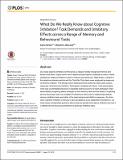Files in this item
What do we really know about cognitive inhibition? Task demands and inhibitory effects across a range of memory and behavioural tasks
Item metadata
| dc.contributor.author | Noreen, Saima | |
| dc.contributor.author | MacLeod, Malcolm David | |
| dc.date.accessioned | 2015-09-10T14:10:01Z | |
| dc.date.available | 2015-09-10T14:10:01Z | |
| dc.date.issued | 2015-08-13 | |
| dc.identifier | 215918181 | |
| dc.identifier | e46ac8d8-9faa-4303-beb2-d694bf6f39e3 | |
| dc.identifier | 000359492800026 | |
| dc.identifier | 84943155388 | |
| dc.identifier | 000359492800026 | |
| dc.identifier.citation | Noreen , S & MacLeod , M D 2015 , ' What do we really know about cognitive inhibition? Task demands and inhibitory effects across a range of memory and behavioural tasks ' , PLoS One , vol. 10 , no. 8 , 0134951 . https://doi.org/10.1371/journal.pone.0134951 | en |
| dc.identifier.issn | 1932-6203 | |
| dc.identifier.uri | https://hdl.handle.net/10023/7438 | |
| dc.description | The authors (SN, principal investigator and MDM as co-investigator) received funding from the British Academy for this research (http://www.britac.ac.uk/). The grant number was SG111104. | en |
| dc.description.abstract | Our study explores inhibitory control across a range of widely recognised memory and behavioural tasks. Eighty-seven never-depressed participants completed a series of tasks designed to measure inhibitory control in memory and behaviour. Specifically, a variant of the selective retrieval-practice and the Think/No-Think tasks were employed as measures of memory inhibition. The Stroop-Colour Naming and the Go/No-Go tasks were used as measures of behavioural inhibition. Participants completed all 4 tasks. Task presentation order was counterbalanced across 3 separate testing sessions for each participant. Standard inhibitory forgetting effects emerged on both memory tasks but the extent of forgetting across these tasks was not correlated. Furthermore, there was no relationship between memory inhibition tasks and either of the main behavioural inhibition measures. At a time when cognitive inhibition continues to gain acceptance as an explanatory mechanism, our study raises fundamental questions about what we actually know about inhibition and how it is affected by the processing demands of particular inhibitory tasks. | |
| dc.format.extent | 21 | |
| dc.format.extent | 281156 | |
| dc.language.iso | eng | |
| dc.relation.ispartof | PLoS One | en |
| dc.subject | Suppressing unwanted memories | en |
| dc.subject | Latent-variable analysis | en |
| dc.subject | Long-term-memory | en |
| dc.subject | autobiographical memories | en |
| dc.subject | Older-adults | en |
| dc.subject | Individual-differences | en |
| dc.subject | Thought substitution | en |
| dc.subject | Eyewitness-memory | en |
| dc.subject | Executive control | en |
| dc.subject | Episodic memory | en |
| dc.subject | BF Psychology | en |
| dc.subject | DAS | en |
| dc.subject.lcc | BF | en |
| dc.title | What do we really know about cognitive inhibition? Task demands and inhibitory effects across a range of memory and behavioural tasks | en |
| dc.type | Journal article | en |
| dc.contributor.sponsor | The British Academy | en |
| dc.contributor.institution | University of St Andrews. School of Psychology and Neuroscience | en |
| dc.contributor.institution | University of St Andrews. Institute of Behavioural and Neural Sciences | en |
| dc.identifier.doi | https://doi.org/10.1371/journal.pone.0134951 | |
| dc.description.status | Peer reviewed | en |
| dc.identifier.url | http://journals.plos.org/plosone/article?id=10.1371/journal.pone.0134951#sec019 | en |
| dc.identifier.grantnumber | SG111104 | en |
This item appears in the following Collection(s)
Items in the St Andrews Research Repository are protected by copyright, with all rights reserved, unless otherwise indicated.

